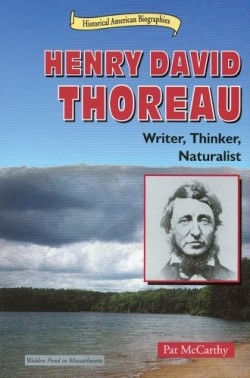Henry David Thoreau
Writer Thinker Naturalist
Henry David Thoreau’s rhetoric instructor viewed him as a student with little promise. The instructor was wrong. Thoreau made impressive accomplishments as a natural scientist, a writer, and a social activist.
The first chapter will attract the reader’s attention as it jumps into Thoreau’s work for social justice, by describing his incarceration for refusal to pay a poll tax that supported slavery and the Mexican War.
Chapters two through eleven chronologically present significant events of Thoreau’s life. His published work during his lifetime consisted of articles, poems, and two books. The final chapter tells about the public’s increased awareness, after Thoreau’s death, of the importance of his nature studies, social action, and writings. Back matter includes a chronology of Thoreau’s life, notes, a glossary, suggested books and Websites, and an index. In addition to this biography, McCarthy has authored several other books in the Historical American Biographies series. This retired elementary teacher’s contributions to magazines include many children’s articles and stories.
Some of the photographs depict old drawings, including one of Thoreau’s birthplace, a two-story farmhouse beside a dirt road. McCarthy emphasizes Thoreau’s commitment to social justice with the following statement: “He said the question was not whether the Fugitive Slave Law was constitutional, but whether it was right.”
This book shows evidence of thorough research. McCarthy uses footnotes to reference numerous facts and Thoreau’s words. Young people will appreciate the many definitions that McCarthy incorporates into the text, such as, “The whole Thoreau family was abolitionist, meaning that they wanted slavery made illegal in the United States.” Readers may be confused about how transcendentalism views experience and observation. Since Thoreau lived in the nineteenth century, his statements contain outdated terminology; McCarthy provides helpful explanations and definitions for most of these difficult expressions. For example, she puts the word “rowed” in brackets following Thoreau’s word, “plied.”
This well-written book will give young people an appreciation for Thoreau’s multiple achievements and inspire them to stand up for their convictions.
Disclosure: This article is not an endorsement, but a review. The publisher of this book provided free copies of the book to have their book reviewed by a professional reviewer. No fee was paid by the publisher for this review. Foreword Reviews only recommends books that we love. Foreword Magazine, Inc. is disclosing this in accordance with the Federal Trade Commission’s 16 CFR, Part 255.

